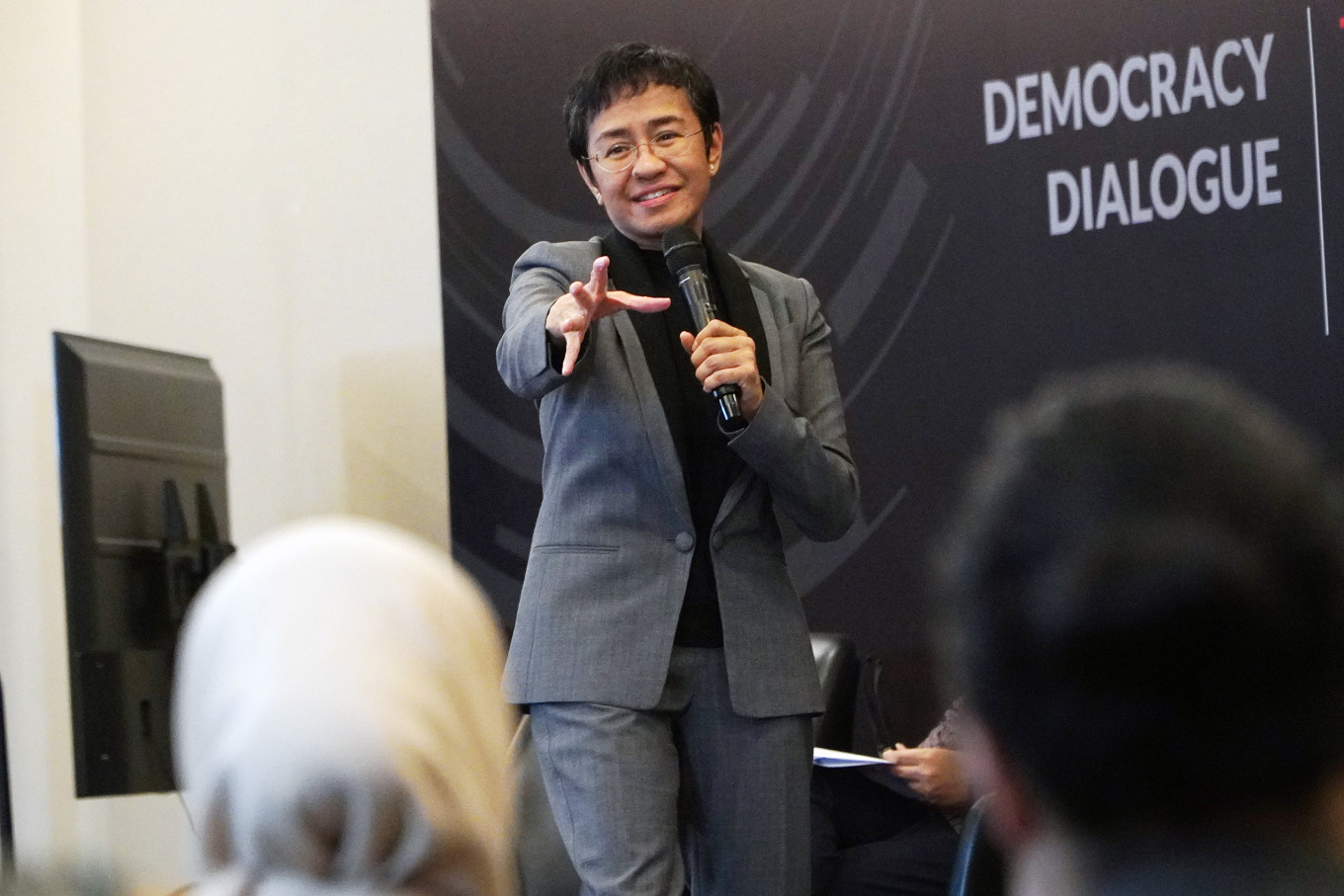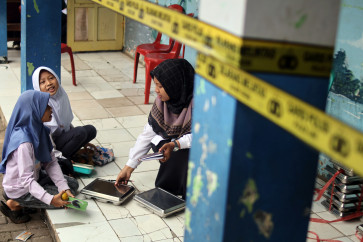Popular Reads
Top Results
Can't find what you're looking for?
View all search resultsPopular Reads
Top Results
Can't find what you're looking for?
View all search resultsEnsuring sustainability of democracy in Southeast Asia
Indonesia was once hailed as a surprising democratic behemoth in Asia, however, we must humbly acknowledge that recent developments have shown a decline in the quality of our democracy.
Change text size
Gift Premium Articles
to Anyone
 CEO of news organization Rappler and Nobel Prize winner for 2021 Maria Ressa speaks at Democracy Dialogue: The Sustainability of Democracy in Southeast Asia in the Centre for Strategic and International Studies (CSIS) Auditorium in Jakarta on Monday. The dialogue was part of a series of events marking the 40th anniversary of The Jakarta Post. (JP/Wendra Ajistyatama)
CEO of news organization Rappler and Nobel Prize winner for 2021 Maria Ressa speaks at Democracy Dialogue: The Sustainability of Democracy in Southeast Asia in the Centre for Strategic and International Studies (CSIS) Auditorium in Jakarta on Monday. The dialogue was part of a series of events marking the 40th anniversary of The Jakarta Post. (JP/Wendra Ajistyatama)
We, the people of the region, have so far been delving into three crucial dimensions of democracy: press freedom, economic development and the questions of democratic sustainability in Southeast Asia.
In each realm, we have encountered challenges that underscore the complexities of our shared democratic aspirations.
In our examination of press freedom and democracy, we confronted the sobering reality of restricted information flows and curtailed journalistic independence in parts of our region. Governments have expanded their efforts to exercise power and influence in online spaces, as digital and social media becomes increasingly important.
In other instances, political interference in media affairs, including direct ownership of media by politicians or political parties, can undermine the independence of the press and erode public trust in credible journalism.
It has also been noted that the swift advancements in technology and the widespread use of social media can have destructive effects on mainstream media and journalists. This is largely due to the rapid and uncontrolled dissemination of information. People are currently enjoying an era of no filter and the spreading of lies over believing in facts.
Our discussion on the relationship between democracy and economic development also revisited the longstanding discourse surrounding the complexities inherent in the two concepts.
We discovered that the connection between democracy and economic development is not as straightforward as one might hope. In fact, some countries in Southeast Asia continue to present mixed evidence, suggesting that economic development can occur under both democratic and nondemocratic governance.
Furthermore, countries like Indonesia may face challenges in managing resource wealth within a democratic framework. We explored instances where uneven economic progress could potentially undermine democratic societies.
In my view, the challenge lies in striking a balance between growth and equitable distribution, ensuring that the benefits of development reach every layer of society.
Finally, our exploration of the challenges to the sustainability of democracy in Southeast Asia led us to contemplate various factors responsible for democratic failure. These include thinking about the types of democratic transition that have taken place, the nature of the relationship between old and new elites, the extent of military reform and the role of political leaders in either maintaining or eroding democratic principles.
All of these factors imply that questions about democratic transition, democratic deepening or even democratic stagnation and backsliding in our region rest on numerous contingent factors unique to each country. And therefore, there is no one-size-fits-all approach to upholding democracy, just as there is no uniform path to its potential collapse.
Indonesia was once hailed as a surprising democratic behemoth in Asia, however, we must humbly acknowledge that recent developments have shown a decline in the quality of our democracy, as evidenced by Indonesia’s lowered ranks in terms of democratic scores as measured by various credible democratic assessors.
And for that, we at The Jakarta Post, with the help of our fellow advocates, observers and our readers, will keep doing our part in safeguarding and nurturing democracy in this country.
I would like especially thank President Jose Ramos-Horta, an old friend since we met in Jakarta in 1965. He and his colleagues have shown first-class magnanimity toward us, his friends in Indonesia. And I would like to propose strong cooperation between the NGOs and think tanks of Timor-Leste and CSIS in Jakarta.
May the conversations we have shared drive positive change, inspiring us to be active citizens in this democratic world, and connecting all of us in more meaningful ways.
May our collective efforts continue to shape the path of democracy in the years to come.
***
The writer is vice chair, Board of Trustees, the CSIS Foundation. The article is based on his closing remarks of the discussion "The sustainability of democracy in Southeast Asia" held to mark the 40th anniversary of The Jakarta Post on Aug. 7, 2023.










